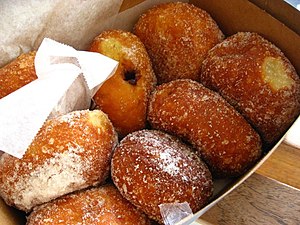Malassada
 | |
| Alternative names | Malassada |
|---|---|
| Type | Fried dough |
| Place of origin | Portugal |
| Region or state | São Miguel, Azores |
| Main ingredients | Wheat flour, sugar, eggs, milk, butter, lemon zest, yeast |
| Variations | Bola de Berlim (Berlin Ball), Farturas, Filhoses, Sonhos |
Malasada (originally malassada) sometimes called "Portuguese fried dough," is a Portuguese pastry particular to the Azores. It is a type of doughnut, made of flattened rounds of yeast dough, coated with granulated sugar and cinnamon. In São Miguel, Azores, it is accompanied with molasses.
Malasadas are often prepared for Terça-feira Gorda (lit. 'Fat Tuesday') with the intention of using all the lard and sugar in one's home before Ash Wednesday, the start of the Lenten Season which limits the use of fats and sugars as a form of penance, similar to other traditions like Pancake Day. It is a traditional confection eaten in the Azores islands and in Madeira during the Portuguese carnival (Carnaval in the Madeira Islands).
The origin of malasadas can be traced back to German Berliners.[citation needed] In Portugal, Berliners are slightly bigger than their German counterparts. They are also known as bolas de Berlim (lit. 'Berlin ball'), and the filling is frequently an egg-yolk-based yellow cream called creme pasteleiro (lit. 'confectioner's cream'). Regular sugar is used to sprinkle it. They can be found in almost every pastry shop in the country.
Etymology
It is often translated as mal-assada, lit. 'badly-bake' (or under-baked). However, another version say in the past it was made using "mel" (Template:Lang-pt), where it would have been named melassadas or melaçadas.[1]
By region
Hawaii
In 1878, Portuguese laborers from Madeira and the Azores went to Hawaii to work in the plantations. These immigrants brought their traditional foods with them, including malassada.[2] In Hawaii, "Fat Tuesday" is known as "Malasada Day". In the past, Catholic Portuguese immigrants shared it with friends from other ethnic groups in the plantation camps.[3]
Today, there are numerous bakeries in the Hawaiian islands specializing in malasadas.[4] Traditional Portuguese malasadas do not have any type of filling, but in Hawaii, they are filled with creams flavored with coconut, passion fruit, guava, pineapple and custard.
North America
In the United States, malasadas are cooked in many Portuguese homes on Fat Tuesday. It is a tradition where the older children take the warm doughnuts and roll them in sugar while the eldest woman – mother or grandmother – cooks them.
On the East Coast, in Rhode Island and Southeastern Massachusetts, there is a high population of Portuguese-Americans. Festivals in cities such as New Bedford and Fall River will often serve Portuguese cuisine, including malasadas.[5]
In media
Malasadas were a purchasable food item in the video game Pokémon Sun and Moon, and one of the main characters, Hau, is obsessed with them.
See also
- Sfenj – Maghrebi fried doughnut rings
- Carnival of Madeira
- Filhós – Fried doughnut of Portuguese origin
- Leonard's Bakery – Portuguese bakery in Honolulu, founded in 1952, famous for popularizing the malasada in Hawaii
- Portuguese Cuisine – Culinary traditions of Portugal
- Portuguese sweet bread – Various Portuguese sweet breads
References
- ^ Fernandes, Daniel. "Malassadas". Produtos Tradicionais Portugueses. Direção-Geral de Agricultura e Desenvolvimento Rural. Retrieved 18 October 2023.
- ^ Robert Carpenter; Cindy Carpenter (30 January 2008). Kauai Restaurants and Dining with Princeville and Poipu Beach. Holiday Publishing Inc. p. 26. ISBN 978-1-931752-37-4.
- ^ Jennifer McLagan (2008). Fat: An Appreciation of a Misunderstood Ingredient, With Recipes. Ten Speed Press. p. 115. ISBN 978-1-58008-935-7.
- ^ Rachel Laudan (January 1996). The Food of Paradise: Exploring Hawaii's Culinary Heritage. University of Hawaii Press. p. 94. ISBN 978-0-8248-1778-7.
- ^ Mimi Sheraton; Kelly Alexander (13 January 2015). 1,000 Foods to Eat Before You Die: A Food Lover's Life List. Workman Publishing Company, Incorporated. p. 274. ISBN 978-0-7611-4168-6.
(2010) Patrick Andrews - "Pioneering the Malasada" Queensland, Australia. 2010

